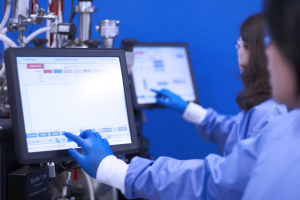In Australia, diarrhoea is annoying and uncomfortable but generally not deadly. However, in some of the world’s poorest nations, diarrhoea is life threatening and it usually takes the lives of our smallest, most vulnerable people: our babies.
Researchers controlling the New Brunswick bioreactor
The main culprit is rotavirus; a major cause of severe and fatal diarrhoea in young children worldwide. It is found in all countries and almost every child in the world would have been infected by it at least once by the time they are three years old.
Rotavirus kills nearly half a million children every year, 85 per cent of whom live in developing countries, where vaccination against the virus is less accessible.
So, what are we doing about it?
PATH is an international not-for-profit organisation that transforms global health through innovation. Currently two rotavirus vaccines, Rotarix and RotaTeq, are available and recommended for global use by the World Health Organization, but they are not yet widely available in or affordable for low-resource countries.
PATH is working on two fronts—increasing access to and effectiveness of existing commercial rotavirus vaccines worldwide and speeding the development of safe, effective, and more affordable new rotavirus vaccines. New vaccines and suppliers will increase the availability of rotavirus vaccines and increase competition. This will help make rotavirus vaccines on the market more affordable and accessible to the world’s most vulnerable children.
PATH came to us because they needed antibodies and we can produce them, lots of them.
‘We will be producing six antibodies for PATH,’ said George Lovrecz, the Leader of our Protein Production and Fermentation Group. ‘The antibodies will be used to test the quality of new rotavirus vaccines being developed.’
Dr Louis Lu working in CSIRO’s recombinant protein production facility used for the large-scale production of antibodies
The antibodies, originally prepared by Dr Carl Kirkwood from Murdoch Childrens Research Institute, will be produced at our Recombinant Protein Production Facility – a laboratory that we use for the large-scale production of cells and proteins. Initially funded by the National Collaborative Research Infrastructure Strategy initiative and Victorian State Government, the Facility is Australia’s only non-commercialised laboratory that can produce proteins, such as antibodies, on a large scale – from hundreds of milligram to kilogram quantities.
‘We have a unique facility in Australia and we can produce the antibodies in large amounts,’ explained George. ‘We will produce enough antibodies to supply PATH’s partners for the next five years.’
‘We are proud to be working on this groundbreaking project to help save the lives of children in the world’s poorest countries,’ he said.



